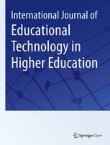In 2019, the journal enjoyed significant growth and development.
Our community of authors, readers and reviewers continues to grow year on year, and we have achieved a comprehensive level of internationalization, receiving papers from all around the world. A quick breakdown of our numbers by geography.
- Last year the journal published articles from authors representing 25 different countries; the United States, Spain, United Kingdom, Germany, Portugal, Turkey, South Africa, Australia, Belgium, China, Italy, Japan, United Arab Emirates, Argentina, Switzerland, Finland, Indonesia, Ireland, Israel, South Korea, Sri Lanka, Mexico, Netherlands, Saudi Arabia and Vietnam.
- The editorial board's members are based in 30 countries; Australia, Belgium, Brazil, Canada, Chile, Colombia, Croatia, Denmark, Ecuador, Egypt, Estonia, France, Germany, Greece, Ireland, Israel, Italy, Japan, Lithuania, Malaysia, Mexico, Portugal, Romania, South Africa, Spain, Sweden, The Netherlands, UK, United Arab Emirates, and the USA.
- 329 experts completed at least one review in 2019 and were located in 69 different countries.
We are very proud of this achievement and we would like to thank our journal's extensive community, our international advisory board and our editorial board for their outstanding support.
2019, was marked by one further significant achievement by the journal: when we received our first Journal Impact Factor (1.922), corresponding to 2018. This is further compounded with the substantial improvement of the journal in other impact indexes such as; CiteScore, Google Scholar Citations, SJR and SNIP. The journal has also improved in altmetrics, which measure the journal's social impact. We continue to work on maintaining and improving the services we offer our authors, guaranteeing short review periods between the submission and publication of their papers. This has been possible thanks to the valuable support provided by our team of reviewers (numbering 329 in 2019), who carry out the review process diligently and with academic rigour, and to the journal's editorial management team. Our social media presence continues to grow, especially on Twitter, where we now have 3,180 followers.
Two thematic issues were published in 2019, “Technology Enhanced Learning or Learning Driven by Technology?” and “Food, Nutrition and the Online: Opportunities and Challenges for Higher Education and Lifelong learning”. The latter was coordinated by two experts in Health Sciences from the UOC, F. Xavier Medina and Alicia Aguilar.
The beginning of 2020 will see the publication of articles from our latest thematic series, which explores the potential of artificial intelligence in education. The series was coordinated by international experts including; Tony Bates (Ryerson University), Cristóbal Cobo, (Center for Research Ceibal Foundation), Olga Mariño (University of Los Andes) and Steve Wheeler (Plymouth Institute of Education). Currently the first two articles are available to our readership: an analysis of educational data to predict academic performance and a review of the research into the application of artificial intelligence in higher education. Furthermore, in March a new series will be published; Towards a critical perspective on data literacy in higher education. Emerging practices and challenges. Edited by: Juliana Elisa Raffaghelli, Stefania Manca, Bonnie Stewart, Paul Prinsloo and Albert Sangrà.
Despite all the major achievements of the journal, many challenges and opportunities exist for researchers and practitioners in the area of educational technology in higher education. Changes in teaching and learning, organizational dynamics of higher education institutions, the need for research to provide evidence and results of application of technologies in education to support continuous improvement and progress of higher education are as urgent, as ever. This is why our journal is a focal point of scholarship and support to HE communities, serving with open access publication of quality research, the International Journal of Educational Technology in Higher Education (ETHE) is an important source of research and point of contact for the academic community immersed in this field. ETHE brings academic rigour and insight to the field of education technology by enabling the publication and dissemination of international research in the field.
The journal’s position in the field continues to improve and we will continue to work progressively to maintain and enhance its position as a leading international journal for education and technology in higher education. Our goal for 2020 is to ensure that the journal is recognised as the best platform for publishing and disseminating research related to educational technology in higher education.
This goal is underpinned by the following three principles, where we
- Ensure the high quality of the articles we publish, thanks to the excellent work of our community of reviewers, with whom we will continue to work and to improve our internal review process.
- Focus on international research relating to current and innovative issues of debate and reflection that impact in the field of educational technology in higher education, involving a rigorous selection from papers received, and by publishing bespoke collections by prestigious guest editors.
- Disseminate the knowledge we publish openly, extensively and on a mass scale through our journal's open pages and social media, thanks to the support of the four institutions that fund the journal.
Our international advisory board, whose members are experts from every continent, works constantly to improve the quality processes that maintain and enhance our journal's academic standing. Coordinating this is our team of editors, derived from the four universities that fund the journal.
We wish you the best for 2020. We hope that you will continue to engage with the International Journal of Educational Technology in Higher Education and keep up-to-date with the latest research in the field of technology in higher education. We will continue to publish research and collections of the highest quality and we cordially invite you to submit your work and findings for review with us.
Kind regards,
Josep M. Duart, Universitat Oberta de Catalunya, Spain (Editor-in-Chief)
Álvaro Galvis, Universidad de los Andes, Colombia (Editor-in-Chief)
Mairéad Nic Giolla Mhichíl, Dublin City University, Ireland (Editor-in-Chief)
Airina Volungevičienė, Vytautas Magnus University, Lithuania (Editor-in-Chief)
Elsa Corominas, Universitat Oberta de Catalunya, Spain (Managing Editor)
